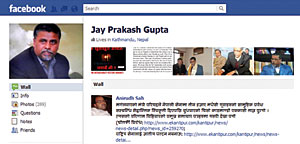 |
The Nepali Congress does not understand the power of social media. This was obvious from the way its US-trained economist-politicians criticised the US Ambassador's Facebook status updates against Monday's Nepal banda.
Far from being political, the ambassador's much-commented-upon post talked about externalities: the economic and social costs forced upon on millions of people when a few politicians encourage their militant youth cadres to go all out to enforce a shutdown. For a political party professing faith in democracy, did it suit NC's image to push its narrow party-political agenda down everyone's throat?
The politicians' criticism also touched upon the envoy's use of Facebook to share his thoughts directly with thousands of his 'friends'. How dare, one could hear the NC politicians asking themselves, the envoy use Facebook to reach out to the people directly and thereby cast us in a negative light? But this is where the historic and pre-historic NC leaders need to wake up, rub their eyes and learn how the media world has changed to upend their sense of politics as usual.
To be sure, the NC leaders are comfortable in the world of traditional media. According to Douglas Arellanes, a media maven in Prague, media is centralised: it has headquarters, physical offices, editors, administrators and so on. That media is also scheduled, in the sense that it adheres to fixed timetables to bring out its dailies, weeklies, fortnightlies and so forth. Sustaining that media requires a lot of money. The payroll is big, and there is rent, utilities and suppliers to pay. It also operates on a tight hierarchy-based control: publishers decide what priorities to fund, editors decide what to put out and those selling ads report their sales results to managers. It is with this media a politician could cultivate relationship, to get his press releases out to everyone.
But thanks to the Internet that media is dying slowly. Many traditional media companies now face a hard time to keep raising revenues from advertisers and subscribers who now enjoy a wider range of choices required to meet their ever escalating costs.
As a result, its place is increasingly taken up by social media. Operating as a social media player requires no office and no schedule and hardly any expense. It has no hierarchy and there's no one to report to. Instead, it's easier for a person to set up a presence on Facebook, Twitter, YouTube, Flickr, or FourSquare and be her own publisher, editor, presenter and writer on anything that catches his or her fancy. If they are good as in the case of make-up guru Promise Tamang, people will follow his or her the way they used to follow traditional media outlets, and his or her influence will rise exponentially. If not, then, there will always be another social media influencer.
Social media is about creating and then deepening authentic relationship with one's friends and followers by using real-time information without the restrictions faced by the traditional media. If mistakes are made you just revise or correct them, something that can't easily be done on a traditional media platform.
According to socialbakers.com, as of December 2011, there are about 1.3 million Facebook users from Nepal. Given Nepal's youth population, it's worth thinking that most of these users are young, educated, internet-savvy Nepalis who aspire for a better, more democratic Nepal. Social media allows them to take part in conversations, discussions and debates about issues that potentially shape the future that they want for themselves in Nepal. It will be the misfortune of Nepali political parties if they disregard social media.



